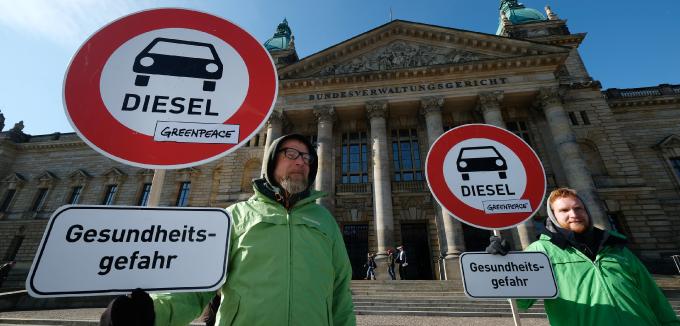
02/27/2018
Driving bans for diesel cars Give gas, automakers – with new proposals
DPA
Activists before the Federal Administrative Court: The verdict on driving bans is a swatter for German carmakers
The driving ban judgment is a swatter for Germany’s automaker. There is little time left for constructive, voluntary solutions – which should be used by car manufacturers.
Frosty as the winter weather – so the mood in Germany’s top auto managers should be up to date. For today they have cashed a veritable swatter that will clog them on several fronts. Diesel driving bans in cities, so the Federal Administrative Court ruled, are also permitted without nationwide uniform regulations.
Owners of older diesel cars must therefore adjust to driving restrictions in some inner cities. First, individual road sections will probably be blocked, about in Hamburg, And the judges also ordered that there must be exceptions for craftsmen – including transitional periods. But driving bans for diesel cars with high nitrogen oxide emissions are not a distant threat today, but a very concrete scenario.
For the German car industry that is a disgrace of the first order. Ironically, in their home country, there will probably be driving restrictions for that engine, which they have made big themselves. For decades, the German automakers have perfected their diesel engines and praised as the world’s most advanced. Each generation was advertised as even more fuel-efficient and polluting than its predecessor.
For years pressed for binding regulations
That most diesel exhaust standards in everyday life is far from being, is known for a long time, Also the high Nitric oxide pollution in cities is not news. Nonetheless, for years politics has been pushing for tougher, more binding regulations, and the levels of nitric oxide in inner cities have remained high. The car industry has done only the bare necessities, played on time – and missed the descent to defuse the situation.
At the “diesel summit” in August 2017, for example, the automakers could have agreed to retrofit dirty diesel cars with hardware solutions. Instead, politics and industry agreed on software updates that will bring only a comparatively small reduction in nitrogen oxide emissions in everyday life.
The subsequent retrofitting with urea catalysts was far too expensive and not technically to do, it said back then. With premiums for the repurchase of older diesel vehicles, the biggest stinkers would disappear quickly from the streets anyway, was another argument.
What the manufacturers could do now – even if it costs something
Newsletter by Wilfried Eckl-Dorna
It may be that the hardware retrofitting is technically complex and not very cheap. On the other hand, the automakers write billions in profits, as the reference to high costs draws only limited. And the credibility of the industry in public technology statements, it has since the exhaust scandal anyway badly ordered.
The car industry would still have some time to act, so as not to finally cheat its millions of diesel customers. Because the verdict of the judges also contains a clear date on which probably future decisions should be based: In Stuttgart Euro 5 diesel vehicles may not be occupied before 1 September 2019 with traffic prohibitions.
Use time until September 2019
The time until then should use the automaker for voluntary measures. For example, they could voluntarily – and for a modest price – offer hardware retrofits for their dirtiest diesel models. Or offer yourself a generous exchange premium for Euro 5 diesel – best for a switch to a gasoline engine, gasoline hybrids or fully electric drive.
The conversion premium for diesel up to Euro 4 emissions standard, agreed at the diesel summit, has given the manufacturers higher sales – but hardly improves the air quality in cities. Because many of the Euro 6 diesels that were purchased under the program are by no means better than their predecessors. As measurements show, many Euro 6 diesel engines also emit many more pollutants in real operation than on the test bench.
Carrying on as before and hoping that the driving prohibition regulations turn out to be less drastic than feared, is of course also an option. However, one that will ultimately cost the car industry far more than it does now.
Related articles
more on the subject
© manager magazin 2018All rights reservedReproduction only with the permission of manager magazin Verlagsgesellschaft mbH
